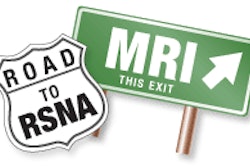Tuesday, November 27 | 3:10 p.m.-3:20 p.m. | SSJ02-02 | Room E450A
A study from University Hospital Aachen in Germany has supported the efficacy of MRI screening for women at average risk of breast cancer, adding that the additional cancer detection rate is high, even in heavily prescreened women.Lead study author Dr. Simone Schrading, from the department of diagnostic and interventional radiology, and colleagues reviewed data from 1,162 women with no personal or family history of breast or ovarian cancer or diagnosis of atypias between January 2005 and December 2010.
The women (median age, 56 years; range, 41-75) underwent a total of 1,482 annual breast MRI screenings during that time. They received bilateral contrast-enhanced 1.5-tesla breast MRI using a 2D gradient-echo pulse sequence.
All women had normal clinical breast exams and normal digital screening mammograms. Additional breast ultrasound was allowed in those with dense breasts, but the women were included only if the ultrasound results were normal.
A total of 22 patients (1.5%) had positive MRI results (BI-RADS 4 or 5). Biopsies conducted on these women were positive for breast cancer or ductal carcinoma in situ in eight cases and revealed high-risk lesions in three other individuals. Biopsy revealed benign changes only in 11 women.
The positive predictive value of MRI was similar to that of mammography, according to the researchers.
They concluded that in this cohort of average-risk women with normal screening mammograms and ultrasound, the additional cancer detection rate achieved through breast MRI was high, at 5.4 per 1,000 women.
The stage distribution of MRI-detected additional cancers was also favorable, and mammographic breast density did not predict the likelihood of which cancers were identified through MRI.


.fFmgij6Hin.png?auto=compress%2Cformat&fit=crop&h=100&q=70&w=100)





.fFmgij6Hin.png?auto=compress%2Cformat&fit=crop&h=167&q=70&w=250)











